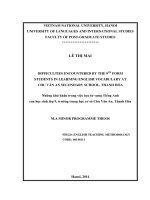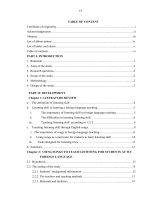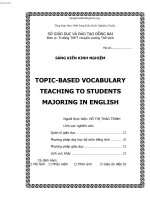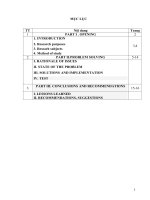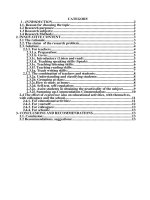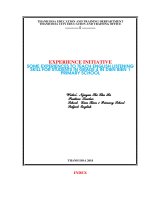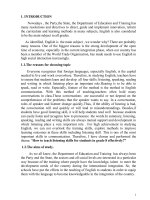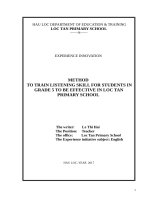SKKN tiếng anh: Development of English listening skills for students in grade 9 Chu Van An Secondary School – Nga Son
Bạn đang xem bản rút gọn của tài liệu. Xem và tải ngay bản đầy đủ của tài liệu tại đây (129.52 KB, 17 trang )
MỤC LỤC
TT
1
2
Nội dung
PART I . OPENING
1. INTRODUCTION
2. Research purposes
3. Researh subjects
4. Method of study
PART II. PROBLEM SOLVING
I. RATIONALE OF ISSUES
Trang
2
3,4
5-14
II. STATE OF THE PROBLEM
III. SOLUTIONS AND IMPLEMENTATION
IV. TEST
3
PART III. CONCLUSIONS AND RECOMMENDATIONS
15-16
I. LESSONS LEARNED
II. RECOMMENDATIONS, SUGGESTIONS
1
PART I . OPENING
1. INTRODUCTION
In the cause of industrialization and modernization, in reality the developing
countries to integrate into the international community in the ASEAN countries
as well as other countries around the world, more particularly, our
country officially a member of the WTO, the know and use fluently at least one
foreign language is an urgent need, a requirement necessary for each of us. The
decisive factor in the victory of industrialization and modernization of Vietnam's
human resources are developed in terms of quantity and quality on the basis of
knowledge standard is improved.Therefore, the education and training of our
country have also conducted changed from target education and training to the
teaching and learning methods in order to contribute effectively to the process of
preparing the country's human capital in the first decade of the 21st century,
learning foreign languages in general and English in particular school has and
will become an extremely hot topic for people of every age, every gender, every
level .
"Language is the most important communication tool of man. "
(V. I. Lenin)
Knowing a foreign language is already in hand to add a new communication tool
outside the vernacular. Since its start learning a foreign language, I was taught
that teachers "Knowing another language is to live a life," which so far and
certainly the future remain valid. Now I bring that up with the knowledge they
learned indoctrinated for generations of his students. As an English teacher, I
always wanted to contribute a small part of his effort to teach secondary school
level students, especially senior students in grades 9 to get a basic knowledge as
the foundation for the children during the classes to learn English in the larger
later.
Teaching and learning English involves many issues, one major problem is the
teaching of listening skills. This is an indispensable skill for people to learn
foreign languages because it is one of the four skills of language skills to
practice English listening, speaking, reading and writing.
In forging practical English skills for pupils and teachers to cope with many
difficulties, especially forging listening skills. Through practice at my school,
you start learning foreign languages like most students study, but the bored
students gradually learn. Most of them are very weak in listening. It's hard to
understand what they hear a lecture or conversation. After each lesson, the
2
teacher listened very difficult to verify the information they have heard and
checking old post often not easy. Most students do not know how to learn to
listen, students often find the most difficult listening. In class, students said that
though in all hear more from already know but hear not, the student has to say
because she is missing the (poor vocabulary), no matter how many times when
studentsalso anxious to learn more listening, they think the main difficulty is
that the pace of the English words too fast, not catch up because apparently they
devoured many sounds and words. So how to help school Biology especially
late Drop 9th graders may apply vocabulary and grammatical structure itself to
listening effectively?Teach how to hear after each class students excited and
loved more courses? How to find a method of positive, simple, easy to
understand, practical while maintaining scientific, to develop thinking ability,
speculation, and creativity of the students? Before the concern that I have boldly
go into the issue "Development of English listening skills for students in grade
9- Chu Van An Secondary School – Nga Son".
2. Research purposes
As we all know, listening is not outside the purpose of communication, it goes
parallel to the three skills: speaking - reading - writing and almost made it a
regular part of the lesson, it is coordinated smoothly , integral with other skills.
This shows whether listening skills is not the frame of language like grammar
that it is "skin, flesh" gave "body" of the language is complete. In
communication, we speak, convey their opinions. But one thing is very
necessary that we must also listen to the opinions of people around to see what
they say and what is proposed. Especially later when our students grow up, they
engage in economic activities - cultural and diplomatic relationships, listening to
the opinions of the enemy is very urgent.
So, the goal of teaching listening skills contraction effect is now we need to help
students to take steps to have good results (listening on purpose). Help students
understand the information through listening, understanding the speaker so that
can master its language.
3. Researh subjects
Students in grade 9 of Chu Van An secondary school – Nga Son district.
School year: 2014-2015
4. Method of study
1 . Method of observation: The implementation of self-exploration theme study,
conducted attend classes colleague visiting hours.
3
2. The method of exchange, discussion: After the hour of colleagues, coworkers who take time to implement the project, colleagues and people to
implement the project to conduct exchanges and discussions so that there are
some lessons lessons learned for.
3. Experimental Methods: Teachers conduct teaching experience required for
each particular purpose some lessons listening.
4. Methods of investigation: Teachers ask questions to check understanding of
content assessment of student lessons.
4
PART II. PROBLEM SOLVING
I. RATIONALE OF ISSUES:
Today, with new awareness in foreign language teaching, teaching English for
the purpose of communication, expand exchanges and cooperation with the
world in all fields: domestic and foreign relations, culture and commerce. ...
marks a major milestone: the investment in human capital in foreign language
teaching and learning, to work towards a modern industry.
To be fluent in a foreign language is no easy thing, but also not so difficult that
can not learn because in a certain extent, foreign language school to learn
English in general and in particular is not something something too difficult if
we have methods and means well, especially when we know the combination of
methods together and exploit the media.
The teaching method at present renewed emphasis to the autonomy of student
creativity. Most of the time when their communication is thinking actively
practice their English. To have a good lesson, the students must prepare their
homework thoroughly. Moreover, to learn listening well, Students should
practicing listening a lot.
It was because the reasons as described above that the purpose of teaching and
learning English is also a big change, it is not only about "learning to learn"
again, but learned to be thinking, in-depth. We not only aim to achieve
grammatical sense but also to achieve and develop skills in using the language.
Understanding the nature of communication and can communicate as needed is
what we reach. LISTENING is regarded as a skill to acquire, but often difficult
to hear than read because the receptor expression through words heard should
have characteristics very different from writing.
II. STATE OF THE PROBLEM
During the teaching of foreign languages in rural areas indeed I myself
encountered many difficulties. Although this is one of the district schools. There
were so many good learning school student in this school. However learning
listening skills are still very difficult. The children enjoyed learning English, but
when they learned listening skills to find very afraid because they do not have
many opportunities to reach out to indigenous people, besides facilities geodiversity not much.
Also part of the children was not really hard learning, little bear in mind from
not practicing sound positive, cognitive delay, the flexibility, creativity is not
high, the document to refer to dependentto the family economy, since
5
investment restrictions learn listening skills. English is also a difficult subject,
body of knowledge more time at school, and in the process of listening to them
uncontrollable things will listen. Words in fast ice, unfamiliar. Last heard a lot
of new words, word stress, sentence stress, intonation is very different and
difficult students can understand the content.
Survey results of the 2014-2015 school year in grade 9:
TSHS
165
Excellent
SL
%
25
15.2
Fair
SL
45
%
27.3
Average
SL
%
60
36.4
Weak
SL
%
35
21.1
The teaching and learning of English in secondary schools has made major
changes in the content and teaching methods to match the objectives and
requirements set out for this subject in the reform program.
The most basic standpoint of innovation approach is to promote a positive,
proactive learners, creating optimal conditions for learning and training, develop
the ability to use language for purposes of communication to not providing pure
language knowledge.
With this view, the tips and activities in the classroom has also been changed
and diversified development. The teacher needs to grasp the main principles of
method and learn the tips and teaching activities in view of communication that
can be applied in a flexible, consistent and effective.
III. SOLUTIONS AND IMPLEMENTATION
1. Learn the concept of teaching listening skills.
Listen to include two levels:
1.1. Level 1: (recognition or distinction): Perception of sounds, words, phrases
in the relationship of their structure. Only when this possibility becomes
automated, the new hearing could reproduce, behave and respond to what is
heard in the sound chain.
1.2. Level 2: (Option): The hearing draws the elements useful to understand the
speaker. At first listen understand sentences, short words, simple, later
understand longer sentences.
2. The study of listening activities:
2.1. Listen in everyday life: there are two main hearing:
- Listen unfocused means listening activities leisure nature, as when we
listening to the radio, watch television ... but still can be done simultaneously for
another job.
- Sounds focus: is the intentional listening activities, want to capture a content
information day.For example, to hear on the radio or television, listen to the
instructions and guidance, explanation, lecture vv..In all cases, the listener
focuses on the important points, necessary for its intention. Listeners often know
6
what they want to hear. This helps the listener towards the attention on the
contents need to know, so often grasp the problem more effectively.
2.2. Listen to the language learning environment:
In the learning environment, listening activities have mostly focused listening,
and to develop different listening skills.
There are the kind heard in language learning as follows:
- Listen for the main idea.
- Listen to find the necessary information.
- Listen to confirm the previous conjecture.
- Listen to perform the task of communication is in place.
- Hear the details (Both the content and structure of language).
3. Organize various listening activities:
3.1. Help students effective listening
In fact, listening is a skill still difficult for today's high school students.
To overcome these difficulties while listening, the teacher can use the following
measures:
- Introducing the topic, the content related to the listening; explain the concepts
if necessary.
- Out of the question to help students predict content will listen.
- Introducing a new word if or review and reinforce the vocabulary needed for
all to hear.
- Out of guiding questions to hear.
- Divide the process of gradual hearing, eg
+ Times First listen: listen gist, answered the question the substance.
+ Last heard two: listen more details etc ..
- If all the long, divided into brief segments listening to the students and have
specific requirements different to hear.
3.2.Guess before it will be heard (predicting)
One of the skills they need to hear is the ability to predict what is going to be
heard. So when the students listening, teachers should give students to guess
what is about to hear in a certain context. Can conduct this operation with all
heard the story or a conversation. For example, when listening to a conversation,
the teacher can stop after a speech of a character in conversation and ask
students what the other person will respond like? Will behave like? Agree or
not? etc ...
3.3. Listen to confirm his guess about the content listening:
It is the same truth applies to reading comprehension skills: Before listening /
reading, teacher suggested exploiting what students already know about the
contents of the issue will be heard / read, what is not clear, what is
not know. Then listen and relate those with prior knowledge of the contents to
be heard.
Example: When conducting a hearing on THE MEDIA - media
(English 9 - Unit 5: The media - page 43), the teacher would ask, suggest what
7
students already know about the media, such as their name, the birth, source,
origin. ..... Then request, or the questions to the students and find answers.
3.4. Listen to retrieve the information needed:
As mentioned, when conducting hearing, teachers necessarily crafted requests,
task listening, focusing on the main contents, important to hear the specific
purpose.
The form of tasks and require very diverse, probably answer the question form
or fill out the form table.
Example: Listen to the report on how our oceans are polluted.Then complete the
notes
HOW THE OCEAN IS POLLUTED
Firstly
raw sewage is pumped directly into the sea
Secondly ---------------------------dropped into the sea
Thirdly
oil spills----------------------------------------Next
--------------------------------------------------Finally
--------------------------------------------------(English 9 - Unit 6: The environment - page 51)
3.5. Listen to capture the gist: (Listen for gist / for main ideas)
In many cases, students need to be listening to understand the main ideas,
concepts
all without extensive attention to detail.
Example: Listen to the conversation and find information about Tim Jones and
Carlo:
- The food they ate?
- The bus they went?
- The sign they saw?
(English 9 - Unit 1: A visit from a pen pal - page 9)
3.6. Listen to perform the following communication activities:
There are listening activities, usually in the form of fill tables, to serve for a
communications operation that followed.
Example: An expert is giving a talk on how to live with Earthquakes. Listen to
the talk, then complete the table
Living with earthquakes
Heavy fixtures, furniture, and appliances:
•
Place heavy books on the ------(1)-----•
Block the rollers on your ------(2)------- and ------(3)-----____________________________________________________________
8
Flying glass:
•
Check the ------(4)-----•
Don’t put your bed near ------(5)-----____________________________________________________________
Earthquakes drill:
•
Stay ------(6)-----•
Sit ------(7)------ or ------(8)-----• Stand in the ------(9)-----(English 9 - Unit 9: Natural disasters - page 77)
After completing the table for all to hear on, students can continue practicing
with the next communication operation is talking again and / or said more about
how to survive an earthquake.
4.Knowing some basic principles when carrying out activities hear:
In order to operate hear achieve the desired purpose, teachers need to perform
some basic principles when conducting a hearing as follows:
4.1. Leading before listening
As mentioned above, after hearing about concentration, the listener often well
intentioned, towards a focus on part want to hear, will know to pay attention to
the content they listen.
So while listening to teacher training should also create the "intent" to students
who are preparing for the upcoming hearing by activities before listening as:
- Introduction context, situation
- These questions suggest, guess about the content about to hear
- The questions create curiosity and create interest in the content about to hear.
- The guiding questions, requests for content necessary to understand etc .. listen
4.2. The requirements and tasks for listening (Listening tasks)
Listening activities necessarily have driven through the requirements and tasks
designed by teachers for students perform. The requirements, this task can be
one or more of the listening exercise form as listed in Section 4.
4.3. Proceed to follow three stages: before heard, while listening to and after
hearing
a / Pre - listening
- Causing excitement
- Establish context
- Create the demand, why listening
- Teach the structure, vocabulary necessary for comprehension .
- Brief content listening
- Suggestions, draws attention to the key points of the listening .
- Have students predict content readings
- If the reader wants to know about all
Teachers create prepare the mind for listening to students by leading locations of
9
questions about the topic of the listening, ask students to observe painting,
reading from and predict whether they are prepared to listen to what topic? Who
is going to say?Talk to? Conversation takes place where?
Teachers can ask students to work in teams to guess the contents of the
preliminary content're hearing through the pictures or listening
situations. Maybe there are things students say exactly what they're hearing, but
the question they are interested before the hearing, understand situations and
themes are about to hear.Teachers can also help students anticipate the
difficulties may be encountered in pronunciation, words or new structure, the
background or knowledge of the culture, country school.
Finally teachers should be made clear to students that they are going to hear how
many times (from 2 to 3 times) and guide requirements, tasks while listening to
(answer questions, select paintings or paintings transplant) time listen and do
homework (3 or 5 minutes).
b / While - listening .
The training activities while listening to the training is done right while students
listen, can listen again and again to perform exercises.
Other forms of exercise at this stage is to learn and exploit content
listening. Depending on the purpose and content of each post, will take the form
of questions and require different operators, could fit the contents, just about
language. The exercises and tips prevalent in this phase usually have the
following form:
Find the word / sentence that says...; Check / tick the correct answer; True –
false;
Complete the table; Fill in the chart; Make up charts / diagrams; Make a list
of...;
Matching; Answer the questions
Teachers turn on the tape or read the listening 2 or 3 times. First time help
students become familiar with all the content comprehension covers listening,
Second hear accurate information to complete the exercises, the third time to
hear and check back exercises did
The main objective of listening comprehension as students take the main content
or retrieve information and understand the attitudes and views of the
author. Therefore teachers should give students listen to their latest catch all
common standard as well as the layout and post homework and then can listen to
each paragraph to check the results, or listening to the hard place to confirm the
answer.
c / Post - listening
10
After students hear and do the comprehension exercise, teachers can continue to
carry out the exercises require extensive understanding of the whole song; actual
contact; transform knowledge, awareness or information, data just received
through listening, practice reinforce key grammatical structures.
Other forms of exercise can be:
Arrange the events in order; Find the sentence that summarizes the content of
the tape; Give the title of the listening text; Disscussion questions; Gap filling;
Guess the consequenses / results of the story.....
Students report to the class or in groups to hear their results, the other students
listen and give comments or cure all for you. Retell, record the basic content of
the listening or conducting development activities, expansion is also a form
thembai listening activities help inculcate knowledge.
4. Instruct students to a number of programs to help develop listening skills:
Many teachers believe that teaching the listening section (listening
comprehension) is the hardest and most students are studying also the hardest to
hear. So teach students how to practice good listening? How can help students
progress quickly while in junior high school? Encourage students to try listening
with several methods:
4.1. See more TV shows or movies speak English / English subtitles are the best
way for learning results. Listen or watch multiple times, before reading the
subtitles. Then, read the subtitles, mainly checking words heard or guessed, or
those from which students can pronounce but does not understand how to write
and meaning. Through this work, much as they discovered that one of them very
familiar but from time immemorial thought to speak in a certain way, they
actually need to speak differently and pronounced like if it is to listen correct
and tell other people to understand. Then look no further subtitles hear back
twice more.For example: the word tomb, bury, students themselves will nail
security is pronounced 'shrimp-b (Matt), Bori' - later to hear the word 'tum, beri'
they do not understand at all - even though she heard it is clear that tum, beri,
until the view script, he can understand
The attached image to make students understand the content at many news
reports, without having to translate every sentence of what the spokesman
said. Students will have peace of mind, after hearing 15 minutes of news, selfsummary of it will find that you have captured the major part of the contents of
the newsletter.
4.2. Listening through the use of specialized listening enclosed cassettes or
listen to the news through radio programs and television in English as VTV
News, Talk Viet Nam, BBC, CNN ...
Listen to the tape and write down on paper what was heard, and then compare
that with the dialogue at the end of the book or the answer provided by the
teacher, this way is said to be most effective, even though the students will take
11
some time time for training method comparable nay.Ta and see the errors that
we have.
Or record a message, and listen to burn it more ... so long as they can not look
up a dictionary to learn that quickly. Guess the meaning of the content, and
recalls the sound of the word, or phrase, then it will be clear that in this, if you
listen again and again.
Or take the script of his songs heard, read and remembered the words read
fantasy I've ever heard it put the script lan.Sau and listen again to
understand. This time I would hear naturally each language and
understand. Where not understand a word or phrase, then repeat several times to
correct as you have heard, then flip the script to compare.
For example: A pupil when listening to VOA, after each program you often hear
a similar phrase: statue, statute or statu something, but do not know how to
write, spell the word for her was not a problem, but still understand that sort of:
wait there to listen to. Then gradually later they will know that he is very
familiar terminology is "stay tuned"
4.3. School or listen to songs in English, and sing along while listening.
Choose a song that you like, find its lyrics and lyrics both hear and see. Then
memorize and sing along with singers, and to pronounce as well as keeping the
speed and degree to right field.When love can also sing to himself (without a
good voice and sang a bit wrong accent is okay, because mostly the
pronunciation, speed, and high school English accent) And tell yavoice (through
song) is another way to help your future more sensitive ear to hear, because
often the language in the songs more difficult to hear these words very much
normal. May have difficulty hearing the phrase is read interlocked, legato
bowing, listening to survive a few key words or misunderstandings that certain
words misleading content
Example: "I go to the copy shop" to misheard as "I go to the coffee shop"
because the tone of the word "copy" is very similar to "coffee".
+ See the animated films on these channels CNN, Cartoon, ... ..
4.4 Guide and give students some English listening address:
+ See TV channels according to the field of music, news, movies,
entertainment ... of the leading media world: CNN, BBC, NBC, ESPN ....
Learning English via Movie Channel trailers, cartoon, chatshows, Entertainment
TV ...
+ Curriculum heard vivid English VOA: Voanews.com
specialenglish
+ Listen to the British America under the theme: Cnn.com/audio/radio
+ Listen to Online Radio CNN: Bbc.co.uk
+ Listen to BBC Radio online: />+ Listening to reports from VOA: Englishclub.com
+ The document then drill, the Anglo-American accent listening:
Rocketboom.com
12
+ Class discussion and exchange in English, listen to others speak, speak
English Skills: Chinswing.com
+ Nbc.com/Video: See and hear the hilarious clip of NBC
Always motivated students that if they give her is not understood now, and I
think that trying in vain to hear more, to learn more was his, when there are
many words to understand then that will set the following hearing they think it's
totally wrong. Because they have not understood to need to hear more people
understand. For swim is to jump into the water, can not use the excuse that
"because I can not stand" should stay on shore for every theoretical study before
jumping down, and will know how to swim!Never swim but the water will drink
water and choke it, but right through the water and then suffocated as new hope
swim. Want to know how to swim, they must jump into the water, swim and
dance before. Because not swim to jump overboard so new. For English
speaking and understanding English, they must listen, listen when not
understand anything! And because not understand what should have heard.
We need to hear some time (fast or slow depending on each person). And so, the
listening is important: Listen whenever, wherever. We can remember hundreds
of sentences in the beginning, but if we do not hear it all meaningless, like a
traveler holding the book learning, ask for directions and unable to place was
because I could not understand people
4.5. Organizing competitions forging listening skills - speaking to students in
class.
+ After each lesson the teacher can listen to student performance, according to
the group. Teachers give students listen again content and hear their request for
examination. As heard answer questions; listen to fill vacancies in the text; listen
and transcribe the contents of the documents, .... Teachers have been rewarded
for helping students with dynamic and interested in learning more.
+ Teachers can also take action in the lesson nghe- read, reading or speaking
skills tastes. All of this is to help students develop listening skills and become
more like learning listening skills.
IV. TEST
After nearly a year of study conducted adopt teaching methods outlined on, I
have watched and quality surveyed students learn English listening skills in
grade 9 Chu Van An Secondary School – Nga Son and have obtained the
relatively positive results. Figures as follows:
13
Scores of
Education
survey
Exellent
Fair
Average
Weak
Poor
First school year
2015-2016
Number
%
30
18.2
50
30.3
55
33.3
30
18.2
0
0
Mid- second term
2015- 2016
Number
%
30
18.2
60
36.4
55
33.3
20
12.1
0
0
Thus, compared to the first survey, the percentage of students scoring proficient,
increased quite markedly, reducing the average student and weak students, and
significant thing of all is the use of This step class taught listening becomes
more vivid, the students have formed a clear listening skills, no longer afraid to
learn to hear again, so that interested and more active learners, promote
dynamism, autonomy, thinking, creativity ... resulted acquire all better, create a
friendly learning environment and effective.
14
PART III. CONCLUSIONS AND RECOMMENDATIONS
I. LESSONS LEARNED
Education is a long-term work hard, hard for the students. Therefore, apart from
tasks teachers impart knowledge must also find ways to make effective school
hours, attracting their attention. Instructions for students learning approach is
very important, especially to encourage them to use English in life, with English
proficiency at a basic level in secondary schools will also contribute to students
better school or high school level can find a good job later. However, there are
still many aspects need to find desk measures more feasible on theoretical basis
and practical experience to carry out the teaching work better, more efficiently.
On the whole this is what I have learned, observations, studies on the issue
"To develop listening skills in English for students in grade 9 Chu Van An
Secondary School - Nga Son"
School was difficult but even more difficult to teach mutilated. So, I think, in
order to become good teachers of foreign language, there must be proper
awareness, explore, create, constantly fostering professional skills, learn
anywhere, anytime, in any forms and encourages students to study, listen to
ideas contributed by colleagues, close, student understanding to draw experience
and find appropriate methods for each unit. Moreover, we ourselves must be
passionate, with enthusiasm for teaching to be able to achieve the results as
expected.
The content I presented above is just the gathering, summarizing the experience
of ourselves, because the ability is limited, narrow the scope of the study,
briefly, little documentation should be sure of what I write out This inevitably be
flawed Song for the purpose of improving the quality of education, I hope this
topic can contribute a little to improving listening skills for students. Look
forward to many valuable comments from superiors and my colleagues to learn
from experience, complete this topic, and perform better next time.
II. RECOMMENDATIONS, SUGGESTIONS
* For professional groups: Organize relevant thematic reports I have studied the
subject to continue to develop in a positive direction-style teaching post
"Developing listening skills in English for students in grades 9 Chu Văn An
Secondary School, Nga Son ". On that basis I would have conditions to develop
research projects, complete more subjects or expand the scope of application.
* For the school: With 45 students per class for narrow space will affect the
organization of classroom activities.
* For local and district Education: Need to pay more attention to subjects such
as English and learn English movement, facilitating more to improve the quality
of teaching and learning of English as: build divisions energy, investments
visual media like tapes, projectors, pictures and references for both teachers and
students ...
I would like to thank!
15
Confirmation of unit heads
Thanh Hoa, 04 April 2016
Commitment not copy . This is done by
myself
The implementation
Le Ngoc Hung
16
REFERENCE BOOKS
Stt
Tên tài liệu
1 Sách giáo khoa tiếng Anh 9
2
3
4
5
6
7
8
9
10
11
Tác gia
Bộ giáo dục và đào tạo
(Nguyễn Văn Lợi tổng
chủ biên)
Sách giáo viên tiếng Anh 9
Bộ giáo dục và đào tạo
(Nguyễn Văn Lợi tổng
chủ biên)
Kỹ thuật dạy tiếng Anh
Nguyễn Quốc Hùng
Tuyển chọn các bài ôn tập và Trần Đình Nguyễn Lư
kiểm tra tiếng Anh nghe hiểu và Xuân Trúc
lớp 9
Nhưng vấn đề chung về đổi Bộ giáo dục và đào tạo
mới giáo dục THCS môn tiếng
Anh
Kiểm tra đánh giá thường Bộ giáo dục và đào tạo
xuyên và định kì môn tiếng (Vũ Thị Lợi chủ biên)
Anh lớp 9
Sổ tay người dạy tiếng Anh
Thái Hoàng Nguyên
Nhưng trò chơi trong giờ học M. F Stronin (Nguyễn
tiếng Anh
Văn Tâm dịch)
Tài liệu bồi dưỡng thường Bộ giáo dục và đào tạo
xuyên cho giáo viên THCS kì (Vũ Thị Lợi chủ biên)
III (2004- 2007)
Ghi nhanh trong nghe hiểu
Trần Ngọc Kim
Hướng dẫn thực hiện chuẩn Bộ giáo dục và đào tạo
kiến thức, kĩ năng môn tiếng (Vũ Thị Lợi chủ biên)
Anh THCS
Nhà xuất ban
NXB Giáo dục
NXB Giáo dục
NXB Giáo dục
NXB Giáo dục
NXB Giáo dục
NXB Giáo dục
NXB Giáo dục
NXB Thanh niên
NXB Giáo dục
NXB Giáo dục
NXB Giáo dục
17

